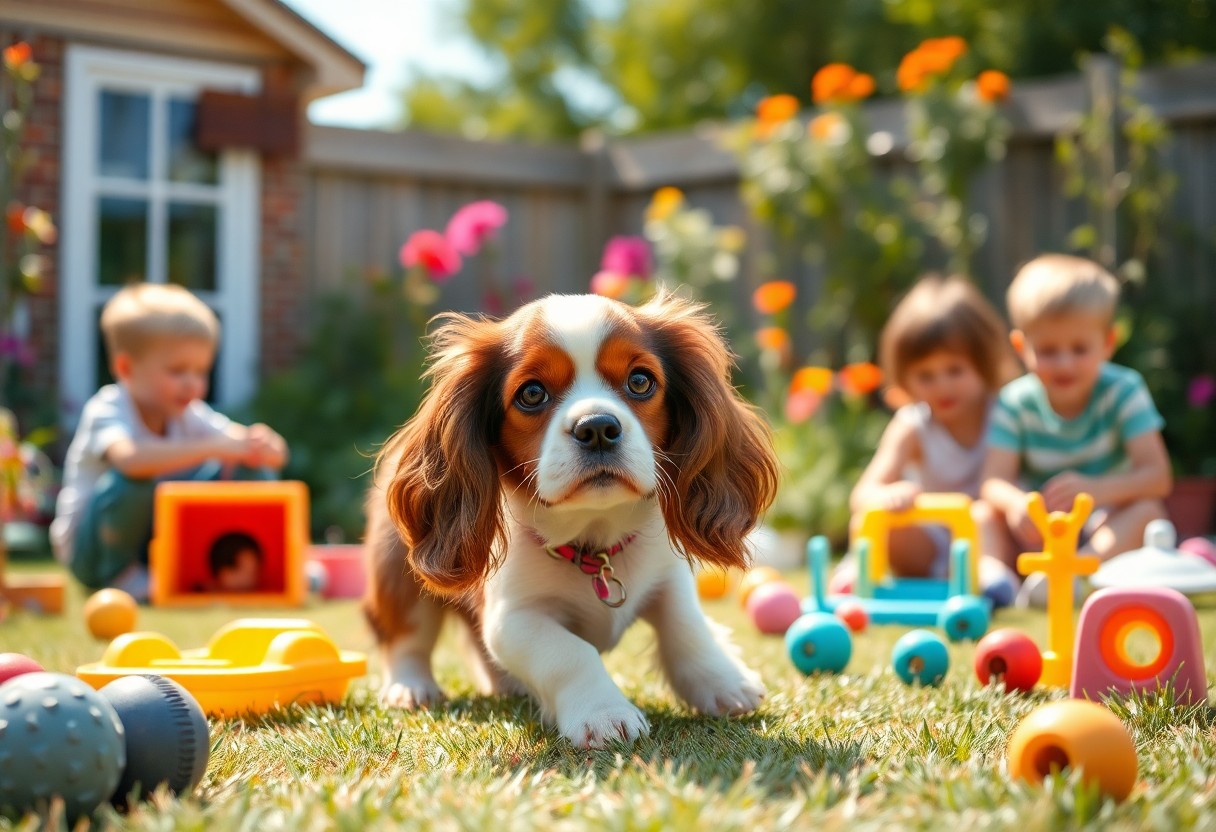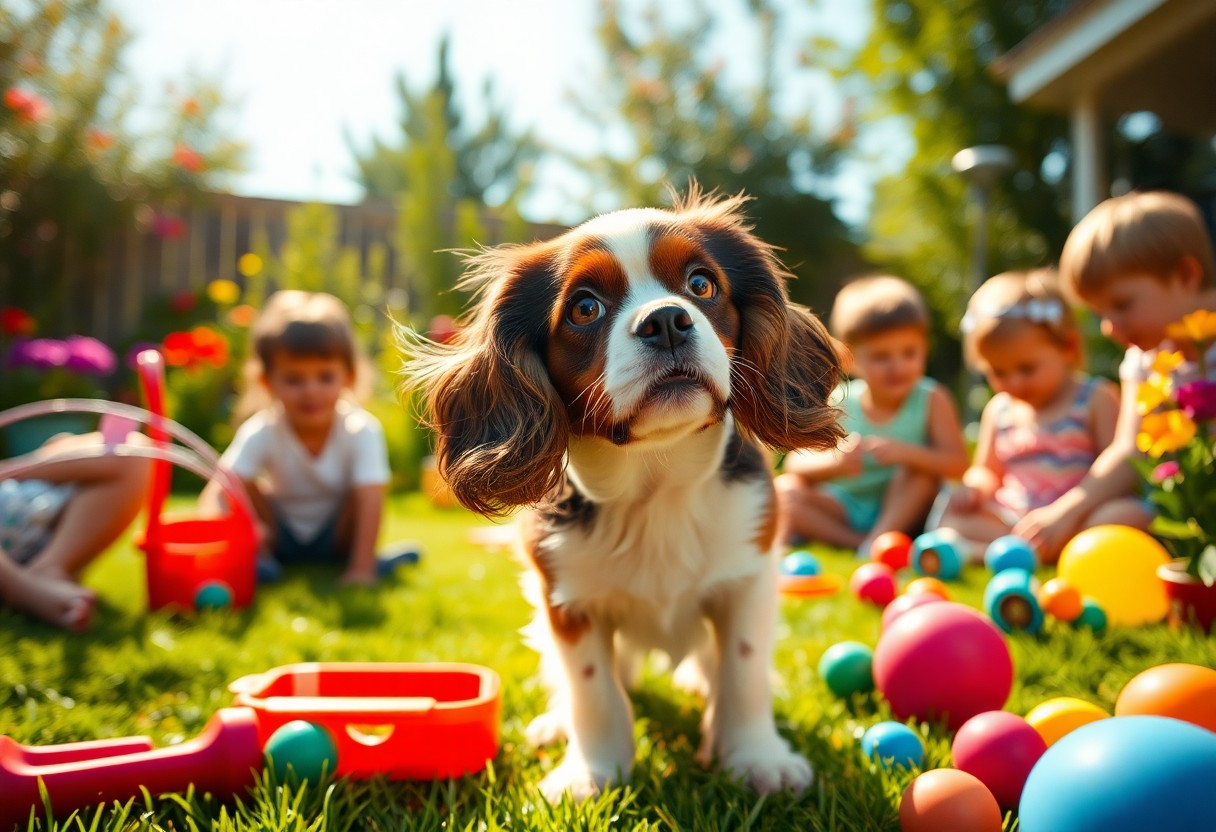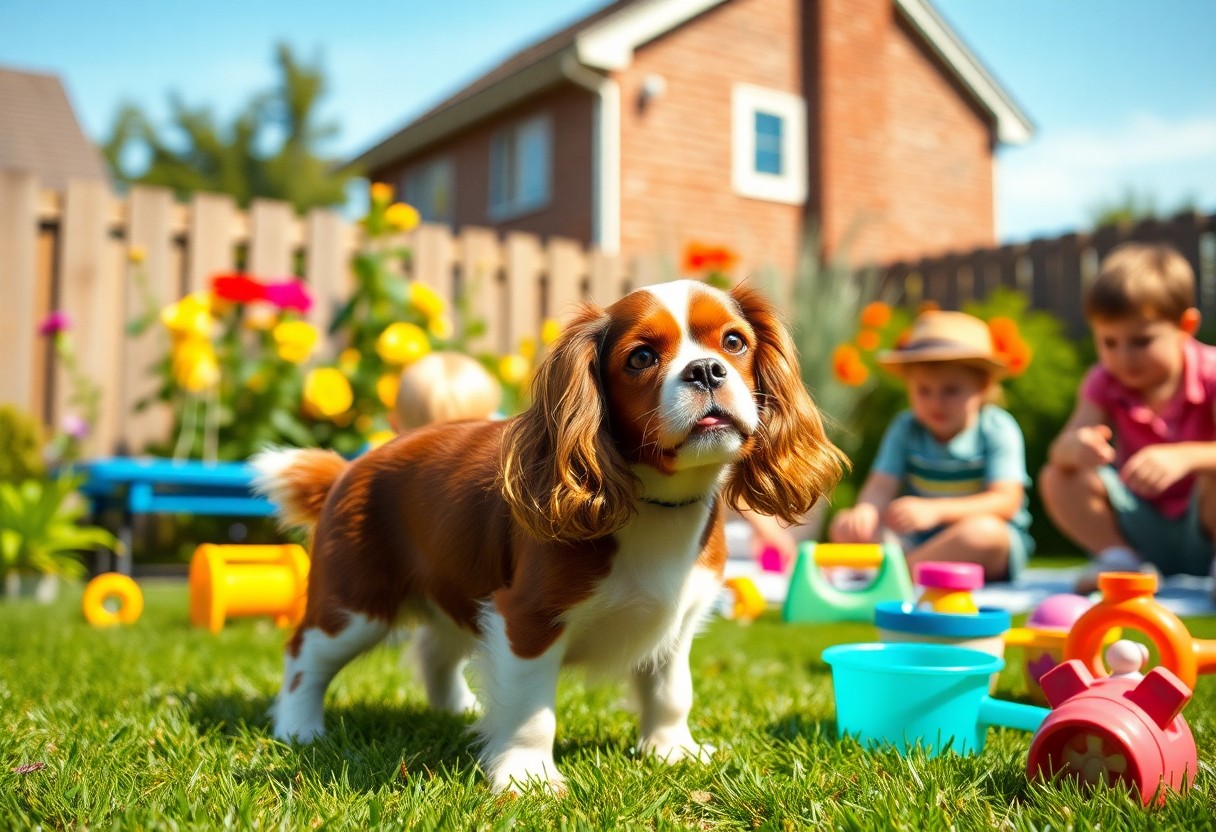Temperament is a key factor in choosing the right dog for your family, and the Cavalier King Charles Spaniel offers a delightful mix of qualities. Known for their gentle and affectionate nature, these dogs are excellent companions who thrive on human interaction. With their playful demeanor and friendly attitude, they are ideal for households with children or other pets. However, it’s important to be aware of their sensitivity and need for companionship, as they may experience separation anxiety without your presence. Understanding these traits will help you create a harmonious home for your Cavalier.
Key Takeaways:
- Cavalier King Charles Spaniels are known for their friendly and affectionate nature, making them excellent companions for families.
- They typically get along well with children and other pets, promoting a harmonious household environment.
- This breed is characterized by its playful energy, which can make them a fun addition to family activities.
- Cavaliers are intelligent and eager to please, making them relatively easy to train and well-suited for various living situations.
- They thrive on social interaction and can experience separation anxiety if left alone for extended periods.
- Regular exercise is important to maintain their health and happiness, though their activity requirements are moderate.
- Due to their sensitive nature, early socialization is recommended to help them develop confidence and adaptability in different environments.
Overview of Cavalier King Charles Spaniel Temperament
For families considering a Cavalier King Charles Spaniel, it’s vital to understand their friendly and affectionate temperament. These dogs are known for their gentle nature, making them excellent companions for children and adults alike. Their loving disposition contributes to their popularity within households. For more detailed information, check out Cavalier King Charles Spaniel Dog Breed Health and Care.
General Personality Traits
The Cavalier King Charles Spaniel is typically affectionate, playful, and gentle. They thrive on human interaction, showcasing a lovable nature that wins over everyone they meet. These dogs are also quite adaptable and possess a keen ability to befriend both people and other pets.
Adaptability to Family Life
Below, you’ll find that the Cavalier King Charles Spaniel has an incredible ability to adjust to your family’s routine, making them suitable for various living situations. Their gentle demeanor allows them to coexist comfortably with children, while their playful nature can help keep your kids entertained.
Traits such as affection, sociability, and intelligence significantly contribute to their adaptability within family life. They are quick learners and respond well to training, which helps them integrate smoothly into your daily activities. Additionally, their calm temperament means they won’t easily get overwhelmed in busy environments. Overall, their loving nature makes them ideal companions for families seeking a devoted pet.
Interaction with Children
You will find that Cavalier King Charles Spaniels are exceptionally friendly and sociable dogs, making them great companions for children. Their gentle nature allows them to bond seamlessly with little ones, fostering a nurturing environment where affection and playfulness thrive. These dogs are known to be patient, making them ideal playmates and providing a comforting presence in your family’s daily activities.
Playfulness and Energy Levels
By nature, Cavaliers are playful and lively, requiring ample interaction and exercise. Their energy levels make them ideal for children who enjoy active playtime, whether it’s running around the yard or engaging in a game of fetch. This breed’s cheerful demeanor and enthusiasm for fun can keep kids entertained and engaged, promoting an active lifestyle for the whole family.
Protective Instincts
Above all, Cavalier King Charles Spaniels are known for their gentle temperament, but they also possess a surprising level of protective instincts. While they are not aggressive watchdogs, they will alert you to unfamiliar sounds or people, ensuring their family’s safety. Their loyalty and affection make them sensitive to their surroundings, leading to a heightened awareness of potential threats.
In addition, Cavalier King Charles Spaniels are not only loving companions but also exhibit a natural vigilance that adds a layer of security to your home. Their protective instincts may come to light when they perceive a situation that feels unsafe for you or your children. However, it’s important to manage their reactions properly, as excessive barking or anxiety can arise if they feel overly protective. By socializing them from a young age and introducing them to various environments, you can foster a well-rounded temperament that balances their affectionate nature with appropriate levels of guarding behavior.
Socialization with Other Pets
Despite their friendly and gentle nature, Cavalier King Charles Spaniels require proper socialization with other pets to ensure a harmonious home environment. Early exposure to various animals can help your Cavalier develop necessary social skills, reducing the likelihood of territorial behavior and fearfulness. This breed thrives on companionship, so encouraging positive interactions with other pets is vital for a well-rounded temperament.
Compatibility with Other Dogs
Before introducing your Cavalier to other dogs, consider their friendly disposition, which generally makes them quite adaptable. Cavaliers usually enjoy the company of fellow canines and engage in playful interactions. However, it’s important to supervise their encounters, particularly with larger or more dominant breeds, to ensure your Cavalier feels safe and secure.
Interaction with Cats and Small Animals
Around cats and small animals, Cavalier King Charles Spaniels can display a mix of curiosity and gentleness. While they tend to get along well with other pets, it’s necessary to introduce them gradually, ensuring a positive experience for everyone involved.
But, it’s vital to be cautious when your Cavalier interacts with cats and small animals. Even though they often exhibit a gentle demeanor, their instinctive hunting behavior might surface, especially around smaller pets. Establish boundaries and supervise their interactions to prevent any potential accidents. Ensure that your Cavalier is well-trained, as this helps to foster a positive relationship with other pets, allowing them to coexist peacefully within your home.
Training and Obedience
After bringing a Cavalier King Charles Spaniel into your family, training and obedience should be a top priority. Early socialization and obedience training help instill good behavior, while also enhancing the bond between you and your pet. To explore more about the breed, check out What to Know About Cavalier King Charles Spaniels.
Learning Ability and Intelligence
For your Cavalier King Charles Spaniel, intelligence shines through their eagerness to learn, making them relatively easy to train. They respond well to positive reinforcement techniques, so be prepared to reward your furry companion with praise or treats.
Techniques for Successful Training
The best way to ensure successful training is to use consistent and positive methods. Focus on short training sessions to maintain your dog’s interest and engage regularly with them for the best results.
And in incorporating techniques, prioritize positive reinforcement to motivate your Cavalier, rewarding them for good behavior with treats, praise, or playtime. Avoid harsh corrections, as these can lead to anxiety and resistance. Keep training sessions short and fun, as your Cavalier thrives on attention and loves to please you. Consistency is key; setting a routine for commands and practice will help your dog learn and adapt more quickly.
Managing Behavior and Temperament
Keep in mind that managing the behavior and temperament of your Cavalier King Charles Spaniel requires consistency and understanding. These affectionate dogs are known for their playful and gentle nature, but their behavior can be influenced by various factors. To learn more about their traits, check out Cavalier King Charles Spaniel | Size, Lifespan, Color & ….
Common Behavioral Challenges
After bringing your Cavalier home, you might encounter common behavioral challenges such as separation anxiety, barking, and difficulty with house training. Understanding these challenges is crucial for fostering a harmonious environment for your family and pet.
Positive Reinforcement Strategies
To address these challenges effectively, implement positive reinforcement strategies that encourage good behavior. This approach involves rewarding your dog for desirable actions, which strengthens their understanding of appropriate behavior while building trust and bonding.
Challenges can arise with Cavalier King Charles Spaniels, especially if they exhibit signs of anxiety or stubbornness. Utilizing treats or praise as encouragement will significantly help in shaping their behavior positively. These dogs thrive on affection and recognition; thus, consistently rewarding good behavior will create a strong bond between you and your pet, resulting in a happier, more well-behaved companion.
Health and Temperament Connection
Unlike many breeds, Cavalier King Charles Spaniels exhibit a strong connection between their health and their temperament. A well-cared-for dog tends to be more affectionate and sociable, making it an ideal companion for families. Conversely, health issues can lead to anxiety or aggression, which can affect their interactions with family members and other pets.
Genetic Factors Influencing Behavior
Before bringing a Cavalier King Charles Spaniel into your home, it’s important to consider the genetic factors that can influence behavior. These factors can include:
- Inherited temperament traits
- Predisposition to health conditions
- Breeding practices
Recognizing these elements can help you select a puppy that will fit well within your family dynamics.
Impact of Health on Family Integration
On the other hand, the overall health of your Cavalier King Charles Spaniel can significantly influence its integration into your family. A dog that suffers from chronic illnesses or pain may display signs of stress or irritability, making interactions less enjoyable for all involved.
Hence, maintaining your dog’s health through regular vet checkups, a balanced diet, and exercise is crucial. This attention not only enhances their lifespan but also fosters a positive disposition. A healthy Cavalier is typically more energetic and loving, which allows them to bond well with family members. Prioritize their well-being, and you will enjoy a more harmonious household filled with joy and companionship.
Summing up
Following this, you can feel confident that the Cavalier King Charles Spaniel is an excellent choice for your family. Their affectionate nature, friendly demeanor, and adaptability make them suitable companions for families of all sizes. You will find that they thrive on social interaction and are generally good with children and other pets. By providing proper socialization and training, you can ensure a harmonious home environment where your Cavalier can flourish and become an integral part of your family life.
FAQ
Q: What is the general temperament of a Cavalier King Charles Spaniel?
A: Cavalier King Charles Spaniels are known for their friendly and affectionate nature. They are gentle dogs that thrive on companionship and love to be around people. This breed typically exhibits a calm demeanor, making them suitable for families, as they are generally good with children and other pets.
Q: Are Cavalier King Charles Spaniels good with kids?
A: Yes, Cavalier King Charles Spaniels are often excellent companions for children. Their playful and loving nature makes them a good match for families with kids. They have a tendency to be patient and tolerant, although supervision is advised, especially with younger children, to ensure gentle interactions.
Q: How do Cavalier King Charles Spaniels interact with other pets?
A: This breed is typically very sociable and can get along well with other pets, including cats and dogs. Their friendly temperament allows them to adapt to various social situations, and they usually enjoy the company of other animals. Early socialization is beneficial to foster good relationships with other pets.
Q: Do Cavalier King Charles Spaniels require a lot of exercise?
A: While they enjoy physical activity, Cavalier King Charles Spaniels do not require excessive exercise. Regular walks and playtime will suffice, making them suitable for both active and less active families. They enjoy leisurely strolls and playful games in the yard and can adapt to various living situations.
Q: Are Cavalier King Charles Spaniels easy to train?
A: Generally, Cavalier King Charles Spaniels are eager to please and respond well to positive reinforcement training methods. They are intelligent and can learn commands and tricks quite quickly. Consistency and patience are key, and early training is recommended to harness their full potential.
Q: What are some common behavioral traits of Cavalier King Charles Spaniels?
A: Common behavioral traits include being affectionate, sociable, and sometimes a little sensitive. They tend to bond closely with family members and may seek to be involved in daily activities. They can also be prone to separation anxiety, so it’s important to provide them with companionship and mental stimulation.
Q: How can families manage a Cavalier King Charles Spaniel’s temperament effectively?
A: Families can manage a Cavalier King Charles Spaniel’s temperament by providing regular exercise, mental stimulation, and socialization opportunities. Establishing a routine for training and playtime helps keep them engaged and happy. Additionally, fostering a loving environment that encourages their natural affectionate tendencies will lead to a harmonious relationship with the family.


